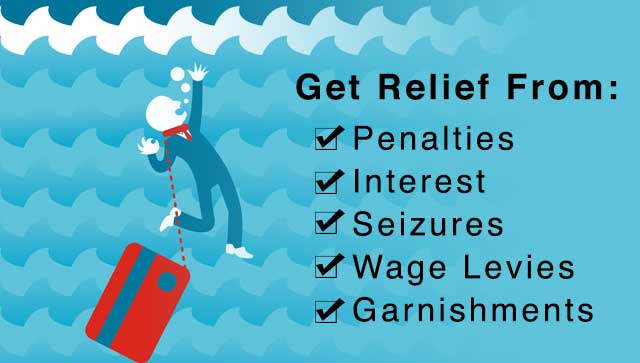Bankruptcy Can Help You Avoid Wage Garnishments and Asset Seizures
If you are going through financial difficulties, you may be considering
bankruptcy as a resolution. After all, bankruptcy can help you achieve
a fresh financial start. Certainly filing for bankruptcy can be an intimidating
step, but having an attorney help you through the process will make it
much easier. Bankruptcy is one of many options, but it may end up being
your only option, especially if you’re looking at wage garnishments,
penalties and interest. There are a few things you need to consider before
you file for bankruptcy in order to determine the type of bankruptcy that
is right for you.
Determine Your Options
In order to determine which type of personal bankruptcy is right for you, you need to understand the two most common bankruptcy used by individuals:
Chapter 7 – With a Chapter 7 bankruptcy, you can wipe out a good portion of your debt in a short period of time. However, with a Chapter 7 filing, you will lose some of your assets and personal property.
Chapter 13 – When filing Chapter 13, you will be in a repayment plan that is worked out with your creditors, and this is based on your income. You will have three to five years to pay these debts off.
Determine Your Eligibility
There are requirements that you must meet when considering each type of bankruptcy. A Chapter 7 bankruptcy proceeding is for individuals who have a lower income. If your income is deemed too high, the court will want you to file a Chapter 13. When you file for Chapter 13 bankruptcy, you must show that you make enough money to meet all the requirements of a structured repayment plan.
Non-Eligible Debts
There are certain types of debts that are not dischargeable with either type of personal bankruptcy you file. For example, you will not be able to discharge any tax debt, child support, and alimony payments. Also, depending on your situation, some credit card debt may not be dischargeable, such as your credit card company disputing your bankruptcy petition.
Some unsecured personal loans may be dischargeable in bankruptcy court, but personal loans where you pledged collateral to secure the loan may not be eligible for discharge.
Asset Protection
You are allowed to hold on to some assets, as the court considers that a way for you to be able to start over financially. However, if you used a valuable asset as collateral for a loan that you are discharging, that asset will most likely not be protected in your bankruptcy proceeding.
If you are considering filing for either type of personal bankruptcy, it’s best to speak with a bankruptcy attorney before you make any decisions


